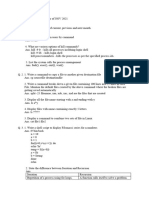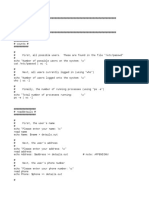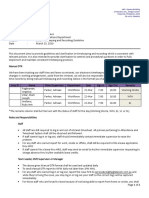0% found this document useful (0 votes)
47 views11 pagesScript
The document outlines a series of tasks for a DevOps and Cloud Computing assignment, including scripts for file management, system health checks, user account management, automated backups, a simple to-do list, software installation, and text file processing. Each task includes a description and a corresponding Bash script to accomplish the specified objectives. The assignment is due on September 16, 2024, and is submitted by Shashank Shekhar Singh.
Uploaded by
Shekhar SinghCopyright
© © All Rights Reserved
We take content rights seriously. If you suspect this is your content, claim it here.
Available Formats
Download as PDF, TXT or read online on Scribd
0% found this document useful (0 votes)
47 views11 pagesScript
The document outlines a series of tasks for a DevOps and Cloud Computing assignment, including scripts for file management, system health checks, user account management, automated backups, a simple to-do list, software installation, and text file processing. Each task includes a description and a corresponding Bash script to accomplish the specified objectives. The assignment is due on September 16, 2024, and is submitted by Shashank Shekhar Singh.
Uploaded by
Shekhar SinghCopyright
© © All Rights Reserved
We take content rights seriously. If you suspect this is your content, claim it here.
Available Formats
Download as PDF, TXT or read online on Scribd
/ 11

























































































